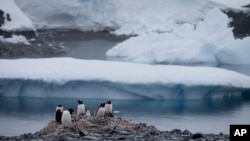Sea ice normally melts in the summer in the Arctic and Antarctic, and recovers in both poles in their respective winters. But not this year. The World Meteorological Organization reports that sea ice extent in the Arctic and Antarctic was the lowest for the month of January since satellite records began 38 years ago.
David Carlson, World Climate Research Program director, calls temperatures in the Arctic "extraordinary."
"It looks like the Northern Hemisphere circulation has changed such that it allows warm air to penetrate deep into the Arctic," he said. "There have been some quite extraordinary temperatures in the few places where we have good measurements. And one of the consequences of that is that there have been time periods, at least three, we think — one in November, one in December and one now that just finished in January — where we actually lost ice or we failed to gain ice in the winter."
Carlson says that should not be happening in winter — the season when the Arctic should be gaining ice, not losing it. He tells VOA the number of years that scientists thought they had until the summer sea ice extent disappeared is shortening.
"What this says is that despite political ups and downs, the change in climate is not going away," he said. "It is not slowing down. It is increasing. It is relentless and, however many decades we thought we might have of comfort level before we have to react, those numbers are going down very, very fast."
WMO reports global heat continues, with January coming in as the third-warmest month on record, after January 2016 and January 2007. Meteorologists say January 2016's record temperatures were caused by a very powerful El Nino, which warmed the waters of the Pacific Ocean and added extra heating to the planet.








